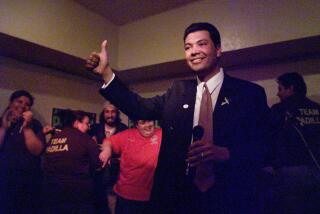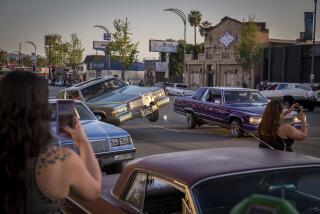Fernando Ruelas dies at 60; co-founder of lowrider car club Dukeâs So. Cal
Fernando Ruelas, who with his brothers founded Dukeâs So. Cal, considered the worldâs oldest continuing lowrider car club, and expanded its reach beyond Southern California during his years as president, has died. He was 60.
Ruelas died of cancer Friday at his home in La Habra, said his brother Ernie.
FOR THE RECORD:
Fernando Ruelas obituary: A news obituary on Fernando Ruelas in the Oct. 27 LATExtra section said the Ruelas brothers founded Dukeâs So. Cal car club. One of the brothers, Rene, is not involved with the club. The story also failed to mention the help of two of Ruelasâ sons, Jason and Alex, in the building of a low-rider ice cream truck commissioned by musician Ry Cooder. â
He was the longtime president of Dukeâs, which the Ruelas brothers started in 1962 and has grown from a South L.A. car club to a collection of nearly 30 chapters stretching to Australia and Japan. Over the years, the brothers â Ernie, Fernando, Julio, Oscar and Rene â transformed countless cars into lowriders, with the vehicles lowered onto their suspensions and then elaborately customized.
âFernando was the ultimate ambassador of lowriding, not just the car-customizing experience,â said Denise Sandoval, a professor of Chicana and Chicano studies at Cal State Northridge and the curator of two exhibits about lowriding at the Petersen Automotive Museum in Los Angeles.
Joe Ray, editor of Lowrider Magazine, said Ruelas was a âpioneerâ who could do everything needed to customize a vehicle.
âHe was like a history book,â Ray said. âHe knew a lot of things he could have kept to himself. He shared his knowledge with everybody.â
One of the Ruelas brothersâ high-profile projects was commissioned by musician Ry Cooder, turning the foundation of a 1953 Chevy truck into a lowrider ice cream truck. It was painted with a mural of scenes depicting the transformation of Chavez Ravine from a Latino neighborhood to the home of Dodger Stadium.
Cooderâs 2005 album âChavez Ravineâ deals with the neighborhood and its residents. Cooder saw the lowrider truck as a way to tell the story visually.
âI got to be really good friends with Fernando and his brothers ⌠and the more I got to know him, the more interested I got in him and began to feel a real kinship with him,â Cooder told The Times this week. âHow he was able to instill this feeling of instilling excellence. You have to have dedication that youâre really going to do a good job.â
Cooder called the finished product âa miracleâ that took several years to complete. He credited Ruelasâ high standards, a quality that made him âuncompromising about everything.... To some people it might seem difficult or ornery or hard to handle, but he wanted you to know he wanted things to be a certain way.â
Artist Vincent Valdez, who created the mural on the truck, said Ruelas was âsuch a craftsman. Whenever he was in the room, he was always the nucleus. He was the center and we worked around him. He was so focused on the way something had to be customized.
âEven while I was working on it, Fernando and his brothers would always come in and work around the truck. We had a great time; it was a beautiful combination.â
Ruelas was born in Tijuana, Mexico, on Feb. 8, 1950. His mother, Josefina, moved her sons to South Los Angeles in 1956. âIt was sunup to sundown to raise us,â Fernando told a Times reporter in 2006. âA lot of thanks has to go to my mother and my Aunt Lucille.â
Lucilleâs husband, Frank Tinker, owned a mechanicâs shop and started the brothersâ connection to cars and other vehicles. âHe was a great influence on our lives,â Ernie Ruelas said.
First, there were go-carts and mini-bikes to work on before advancing to cars. Over the years, they have had a series of custom auto shops.
âWe started doing the car thing when we were very young,â Fernando Ruelas said in 2007. âAt 11, 12, 13, we basically owned our own cars already. Back then, you could buy a car for $15.â
Lowriders emerged as part of the car culture boom after World War II, Sandoval said, with drivers using their vehicles âto express who they were and to build community with other men.â
The cars are known for their chrome features, custom upholstery and iridescent âcandyâ paints. They usually include a hydraulic system so the carâs height can be adjusted.
Ruelas told The Times in 2007: âYou get in there with a nice-looking vehicle and cruise up and down and show your car off. Youâve got good music of course. Youâve got a nice-looking lady inside â all three have to go together.â
In 1962, the brothers formed Dukeâs, with Julio Ruelas as the first president. He died in 2007.
During the Vietnam era, club membership declined for a variety of reasons, Ernie Ruelas said, but in the early 1970s, when Fernando returned from serving in the Army, he worked to rebuild Dukeâs as its president with a new name (Dukeâs So. Cal instead of Dukeâs L.A.) and some membership limits.
âTwenty-one or older. No drugs. I wanted to be able to legally say, âHey youâre not suitable,ââ he explained to a Times reporter in 2006.
âIn the early days, we were almost gangs on wheels,â said Ray, who credited Fernando Ruelasâ counsel when Ray was made president of the Lifestyle Car Club. Fernando Ruelas âexplained things to us.... He wanted to show the good side of lowriding,â Ray said. âTheir family was like role models.â
Dukeâs became more family-oriented with car shows, cultural events and other activities.
âWe do all these things to bring awareness to this neighborhood,â Ernie Ruelas told The Times in 2006. âYou see art being built here. You see something different. A family working together. Friends working together. People working together.â
Filmmaker Rick Tejada-Flores, whose documentary âLow âN Slow, the Art of Lowridingâ included members of the Dukeâs car club, described lowriding as a way to âdefine yourself and your community, reject the melting pot.â
Working in Los Angeles in the 1970s, Tejada-Flores said he âwas particularly interested in Latino culture and you never saw a positive story about lowriders. They never got any respect.... What I found was those perceptions were completely reversed [among residents]. Lowriding was not something to be looked down on; it was beautiful.â
In addition to his mother and surviving brothers, Ruelas is survived by his wife, Gloria; three sons, Alex of Chino, Jason of La Habra and Matthew of La Habra; and a grandchild.
A funeral Mass will be held at 9 a.m. Saturday at Our Lady of Guadalupe Church, 900 W. La Habra Blvd., La Habra. There will be a viewing from 3 to 8 p.m. Friday at Queen of Heaven Mortuary, 2161 S. Fullerton Road, Rowland Heights.
More to Read
Sign up for Essential California
The most important California stories and recommendations in your inbox every morning.
You may occasionally receive promotional content from the Los Angeles Times.










